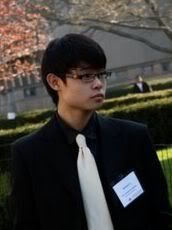I stood there.
The American flag, in silent glory, soared high above grey walls and black gates; enclosed behind layers of reinforced steel walls and doors, 6-inch think glass and Marines. I looked up towards the familiar white stars and red stripes, and for a moment, I felt proud.
To be strong, to be American.
—
What was discussed within those grey walls and black gates cannot be disclosed, but not because of any heated discussion or leaked information, but because of protocol, something that exists excessively in America, and in our embassy in Beijing as well.
The Embassy of the United States in Beijing is the second largest foreign embassy of the United States in the world, while the largest is in Iraq.
We had come with high expectations that day, the result of more than a week’s worth of memorable visits to multinational corporations like UBS, JP Morgan, Ernst & Young, Freshfields Bruckhaus Deringer, PricewaterhouseCoopers, and Microsoft, among others. Each company arranged not only an office tour, but also some sort of presentation by top executives and leaders within their HR department.

GCC Beijing Winter Delegation at JP Morgan with Vice Chairman Elaine La Roche and Senior Vice President Nevin Xiao
Though surprisingly, the Chinese corporations [Everbright Bank/光大银行, CNTV.com/中央网络电视台, Ping An/中国平安, New Oriental School/新东方, and Sina.com/新浪], were equally, if not more welcoming in their receptions.
Everbright Bank arranged for us to meet with a board consisting of nine of its top chief representatives, each having had experience studying or working in North-America. CNTV.com [formerly known as CCTV.com], gave us an exclusive tour of their site, as well as a special metro card that are only used by CCTV anchors [you can’t buy these things]. New Oriental School invited nearly 100 attendees to hear us speak about college admissions and student life in the United States.
China is truly opening up, and we can all witnesses this when we choose to look.
However, what I found most surprising, was how quick and cold our own embassy was to push us outside its grey walls and black gates after the 1.5hr-long visit.
As much as we appreciated the opportunity to visit the embassy, truthfully, we felt confused, and for us several Americans, embarrassed. As someone with strong beliefs in the capabilities of international diplomacy, I was most excited about visiting the US embassy when looking through our itinerary on Day 1.
On Day 10 I felt extremely disappointed.
When President Hu invited President Obama to the Great Hall of the People back in November, the two worked up quite the storm when Obama pledged to have 100,000 students studying in China by 2013. China currently has about 100,000 students in the US, while the US has about 20,000 students in China [WSJ].
Clearly, someone better get to work.
And while we found no answers that day, we did take something away: a new sense of responsibility and accountability.
On the American side, we cannot rely on our government to take initiative and mobilize our schools to create more opportunities for students to learn Chinese. Resources are much too scattered and scarce, and our system is much too ineffective. There’s too much protocol.
Ironically, it seems as if this 100,000 student promise has fallen on the shoulders of us students, though more specially, on the shoulders of student leaders.
To Student Leaders:
We cannot afford to limit our interactions to a passing exchange and hand shake, and we cannot afford to solely participate in what’s already being done and provided for us. It’s not enough. We must become initiators as we well. We must first set precedent, and then drive progress, inspiring our generation and future generations of students to take those first steps towards understanding China, and then to do the same as we did.
Resources have never existed in mediums like Wikipedia and Facebook, and never before have we been more capable of connecting with willing and able mentors, and each other.
How we use these resources and what we use these resources for, will define our era of US-China relations.
Remember, as a student leader, your abilities are no less than those of current leaders, only less cultivated.
And remember that even this is an advantage.
—
I stood there.
Eight friends, in confident stride, walked towards a bustling Beijing subway station; poised to cure hunger, defuse conflict and lead countries. Hearing their laughter, I looked up, and for a moment I felt proud.
To be the future, to be hope.






